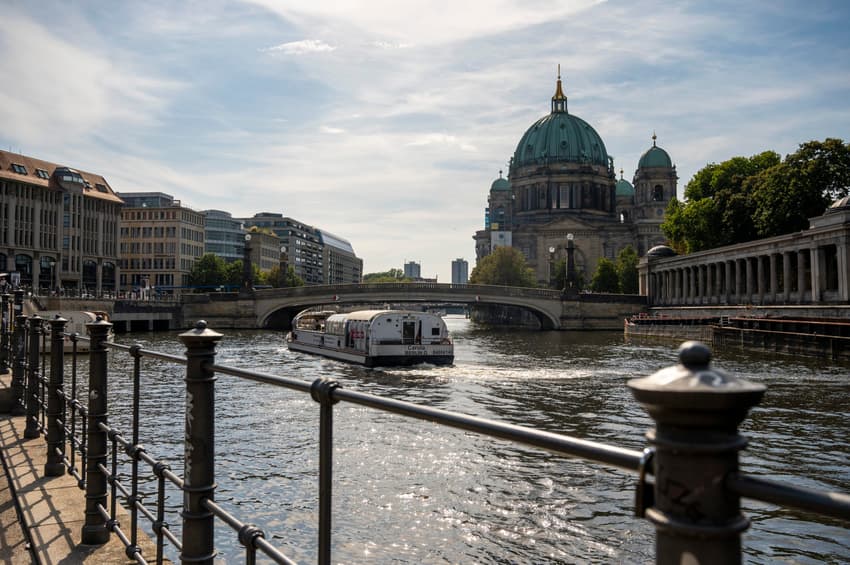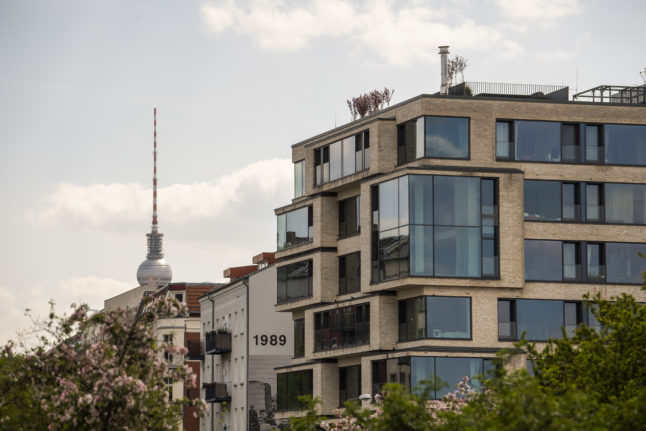Moving to Germany: How much money do I need to live in Berlin?

Berlin is known for being the cheapest capital city in Western Europe - but Germany's largest city is also getting pricier by the day. Here's how much you'd need to earn to live there.
For a few decades after the wall fell, Berlin's motto was "Arm aber sexy" (poor but sexy). Though the city was in financial ruins after reunification, palatial flats could be rented for next to nothing, making the city a magnet for an increasingly international and bohemian crowd.
These days, the German capital is changing at an alarming rate, and with the general cost of living also rising rapidly, living there on a shoestring is no longer a viable option.
That said, in comparison to most other major cities in Western Europe, Berlin remains relatively affordable - and you certainly don't have to be a millionaire to relocate there.
If you're thinking of making a new life in the German Hauptstadt, here are the costs you'll need to factor in. Since there are lots of ways to make things more expensive (i.e. by opting for a larger flat or shopping at more expensive supermarkets) we'll mainly opt for the cheapest options.
Rent: €800
For people on lower incomes, rent in Berlin will probably be by far the largest expense each month. The cost of renting a flat has been soaring in recent years and shows no sign of slowing down anytime soon, so it's good idea to set a realistic budget before moving there.
According to data gathered by property portal Wohnungsboerse, the average rental price in Berlin shot up to a staggering €23 per square metre in 2022, which means that the average 35 square metre flat for one person would cost €800 per month. This is based on listings on the Wohnungsboerse website, however, so it is certainly possible to find cheaper options.

A luxury apartment complex in Berlin Prenzlauer Berg. Photo: picture alliance/dpa | Christophe Gateau
It's worth noting that, since one-bedroom properties are in high demand, the price-per-metre tends to come down a bit for larger properties. According to the same Wohnungsboerse survey, flats of 60-square-metres and upwards tend to be around €20 per square metre, which works out at €1,200 for 60-square-metre flat.
There are some other ways to make things cheaper, such as by searching in less central and/or popular areas. For those on a really tight budget, however, by far the cheapest option is to find a room in a shared flat, which is known in German as 'WG'.
The most recent survey data available suggests that the current average price of a room in Berlin is €500, including all additional costs.
RED ALSO: EXPLAINED: The German cities where rents are rising fastest this year
Utilities: €170
With the cost of energy rising so steeply, it's increasingly hard to predict how much to put aside for utilities. Some recent estimates suggest that a single-person household will face an annual bill of around €720 for gas heating alone, which works out at €60 per month.
Currently, electricity contracts are also around €60 per month, while an internet and mobile phone contract is likely to set you back around €50 per month, depending on the length of the contract and your requirements.
This is all based on a single-person household living in a relatively small flat. Families and couples living in larger properties should expect their bills to be significantly higher.
Transport: €60
Berlin has an extensive public transport network, meaning that you'll be well connected by tram, bus or train almost anywhere in the city.
An annual ticket for the main two zones (which is generally all most people require) works out at around €60 per month.
One small caveat here is that the federal government is planning to bring in a new, national transport ticket in January 2023.
Though it isn't a massive difference from the annual subscription, it could cost as little as €49 per month, regardless of whether you pay for a year's travel in advance or opt for a monthly subscription.
READ ALSO: What we know so far about the successor to Germany’s €9 ticket
Groceries: €200
Though the cost of living is on the rise, supermarkets in Germany tend to be quite affordable, and Berlin is no exception.
For people on a budget, shopping at discounters such as Netto, Aldi and Lidl, as well as at international supermarkets, is a good idea.
At these cheaper supermarkets, it shouldn't be too hard to cover monthly food shopping for a single-person household for around €200 per month.
Childcare: €23
Since 2018, a place at a Kita (nursery school or kindergarten) in Berlin has been free of charge. The only expense most parents face is a €23-per-month fee to help cover the cost of lunches.
It's worth noting that nurseries are permitted to ask for an additional €90 per month if they offer special services like language lessons or organic meals. That means that, at most, the cost of childcare would be €113 per month.
However, one thing to keep in mind is that it can be difficult to find a spot for your child since they are in demand.

Children's toys outside of a Kita in Berlin Wilmersdorf. Photo: picture alliance/dpa | Christoph Soeder
Total budget for essentials: €1,253
If you're planning on living in your own flat in Berlin, rather than a flat share, you'll need to set aside around €1,250 per month to cover the basics.
However, there is one more thing you'll have to consider if you're negotiating a salary...
Taxes and social charges: €430
A key thing to note about life in Germany is that around a third of your salary is usually swallowed up in taxes and so-called "social charges", which means things like pension payments and health insurance.
If you're employed, your company will be expected to cover half of these social charges, but they can still add up. For instance, if you want to have at least €1,250 in left in your pocket at the end of the month, you'll need to ask for a salary of at least €1,700 per month.
According to an online tax calculator, this would leave a single person who doesn't pay church tax with a net income of €1,269, which should cover the main expenses of life in Berlin.
READ ALSO: What you need to know about the complicated world of German insurance
What about leisure and social time?
In a vibrant city like Berlin, you'll obviously want to have some money left over for having fun and meeting new people.
To help you budget for that, here's a taster of what a few different activities and food and drink items cost while you're out and about:
Pint of beer: €2-4
Glass of wine: €3-5
Döner kebab: €3-5
Cinema tickets: €8-9
Museum Island day ticket: €19
Gym membership: €20-50 per month
Club entry: €15-20
Meal for two at a mid-range restaurant: €40-60
Comments
See Also
For a few decades after the wall fell, Berlin's motto was "Arm aber sexy" (poor but sexy). Though the city was in financial ruins after reunification, palatial flats could be rented for next to nothing, making the city a magnet for an increasingly international and bohemian crowd.
These days, the German capital is changing at an alarming rate, and with the general cost of living also rising rapidly, living there on a shoestring is no longer a viable option.
That said, in comparison to most other major cities in Western Europe, Berlin remains relatively affordable - and you certainly don't have to be a millionaire to relocate there.
If you're thinking of making a new life in the German Hauptstadt, here are the costs you'll need to factor in. Since there are lots of ways to make things more expensive (i.e. by opting for a larger flat or shopping at more expensive supermarkets) we'll mainly opt for the cheapest options.
Rent: €800
For people on lower incomes, rent in Berlin will probably be by far the largest expense each month. The cost of renting a flat has been soaring in recent years and shows no sign of slowing down anytime soon, so it's good idea to set a realistic budget before moving there.
According to data gathered by property portal Wohnungsboerse, the average rental price in Berlin shot up to a staggering €23 per square metre in 2022, which means that the average 35 square metre flat for one person would cost €800 per month. This is based on listings on the Wohnungsboerse website, however, so it is certainly possible to find cheaper options.

It's worth noting that, since one-bedroom properties are in high demand, the price-per-metre tends to come down a bit for larger properties. According to the same Wohnungsboerse survey, flats of 60-square-metres and upwards tend to be around €20 per square metre, which works out at €1,200 for 60-square-metre flat.
There are some other ways to make things cheaper, such as by searching in less central and/or popular areas. For those on a really tight budget, however, by far the cheapest option is to find a room in a shared flat, which is known in German as 'WG'.
The most recent survey data available suggests that the current average price of a room in Berlin is €500, including all additional costs.
RED ALSO: EXPLAINED: The German cities where rents are rising fastest this year
Utilities: €170
With the cost of energy rising so steeply, it's increasingly hard to predict how much to put aside for utilities. Some recent estimates suggest that a single-person household will face an annual bill of around €720 for gas heating alone, which works out at €60 per month.
Currently, electricity contracts are also around €60 per month, while an internet and mobile phone contract is likely to set you back around €50 per month, depending on the length of the contract and your requirements.
This is all based on a single-person household living in a relatively small flat. Families and couples living in larger properties should expect their bills to be significantly higher.
Transport: €60
Berlin has an extensive public transport network, meaning that you'll be well connected by tram, bus or train almost anywhere in the city.
An annual ticket for the main two zones (which is generally all most people require) works out at around €60 per month.
One small caveat here is that the federal government is planning to bring in a new, national transport ticket in January 2023.
Though it isn't a massive difference from the annual subscription, it could cost as little as €49 per month, regardless of whether you pay for a year's travel in advance or opt for a monthly subscription.
READ ALSO: What we know so far about the successor to Germany’s €9 ticket
Groceries: €200
Though the cost of living is on the rise, supermarkets in Germany tend to be quite affordable, and Berlin is no exception.
For people on a budget, shopping at discounters such as Netto, Aldi and Lidl, as well as at international supermarkets, is a good idea.
At these cheaper supermarkets, it shouldn't be too hard to cover monthly food shopping for a single-person household for around €200 per month.
Childcare: €23
Since 2018, a place at a Kita (nursery school or kindergarten) in Berlin has been free of charge. The only expense most parents face is a €23-per-month fee to help cover the cost of lunches.
It's worth noting that nurseries are permitted to ask for an additional €90 per month if they offer special services like language lessons or organic meals. That means that, at most, the cost of childcare would be €113 per month.
However, one thing to keep in mind is that it can be difficult to find a spot for your child since they are in demand.

Total budget for essentials: €1,253
If you're planning on living in your own flat in Berlin, rather than a flat share, you'll need to set aside around €1,250 per month to cover the basics.
However, there is one more thing you'll have to consider if you're negotiating a salary...
Taxes and social charges: €430
A key thing to note about life in Germany is that around a third of your salary is usually swallowed up in taxes and so-called "social charges", which means things like pension payments and health insurance.
If you're employed, your company will be expected to cover half of these social charges, but they can still add up. For instance, if you want to have at least €1,250 in left in your pocket at the end of the month, you'll need to ask for a salary of at least €1,700 per month.
According to an online tax calculator, this would leave a single person who doesn't pay church tax with a net income of €1,269, which should cover the main expenses of life in Berlin.
READ ALSO: What you need to know about the complicated world of German insurance
What about leisure and social time?
In a vibrant city like Berlin, you'll obviously want to have some money left over for having fun and meeting new people.
To help you budget for that, here's a taster of what a few different activities and food and drink items cost while you're out and about:
Pint of beer: €2-4
Glass of wine: €3-5
Döner kebab: €3-5
Cinema tickets: €8-9
Museum Island day ticket: €19
Gym membership: €20-50 per month
Club entry: €15-20
Meal for two at a mid-range restaurant: €40-60
Join the conversation in our comments section below. Share your own views and experience and if you have a question or suggestion for our journalists then email us at [email protected].
Please keep comments civil, constructive and on topic – and make sure to read our terms of use before getting involved.
Please log in here to leave a comment.